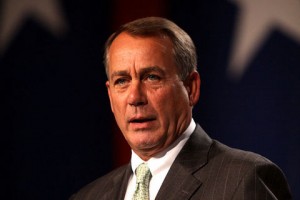
U.S. Rep. John Boehner
U.S. Rep. John Boehner’s resignation announcement following Pope Francis’ visit last week, unleashed a wave of concern. Black leaders are wondering how his departure will effect legislation that disproportionately impacts Blacks and other minorities.
Over the past five years, as Speaker of the House of Represenatives, Boehner has clashed with a conservative Republican base uninterested in bipartisanship compromise and unwavering in its opposition to the Obama administration’s priorities. With legislation in limbo that would cut funds to Planned Parenthood, challenge the constitutionality of universal healthcare, and limit the reach of public housing, education, and social security, members of the Congressional Black Caucus members voiced lukewarm optimism over Boehner’s resignation, saying that while he could be a staunch opponent, his replacement as Speaker of the House could be potentially worse.
In a statement released after Boehner’s announcement, Del. Eleanor Holmes Norton (D-D.C.) said that from the start Boehner positioned himself as an enemy of the District of Columbia. “On the hot-button issues, he has not discouraged or stood in the way of Republicans who opposed home rule and democracy for the residents of the District,” Norton said. “If anything, his resignation appears to signal a worsening, not an improvement, of the polarized Republican majority, which, in refusing all compromise, has given Congress its lowest rating in history.”
U.S. Rep. Elijah. E. Cummings (D-Md.), offered a similar statement urging his colleagues to put the American people before partisan politics in selecting Boehner’s replacement. “The Pope urged Congress to work together, but today Speaker Boehner apparently determined he cannot achieve this goal, particularly in the face of relentless and reckless attacks by extremists in his own party whose actions will lead to more chaos, not compromise,” Cummings said.
Political scientist and Howard University professor Wilmer Leon said that Boehner’s resignation may not have as much of a substantive impact on Blacks as minority members of Congress suspect. Citing what he calls the “ultra, ultra conservative” tone of the Republican Party, Leon said that whomever takes Boehner’s place presents only a rhetorical shift.
“Whether it is Kevin McCarthy or someone else among the ranks, Boehner’s replacement will most likely be as obstructionist as he was,” Leon said. “Obama’s record has been no populace corporate American agenda, and there has been no legislation targeted to the African-American community, though they have been the indirect beneficiaries of a lot of things. This Congress has reacted to an African-American president and decided to be obstructionist because of an African-American president. That will not change . . . it’s almost a game of ‘Pick a Republican’,” Leon said.
Leon, host of the XM Satellite Radio show “Inside the Issues,” said the only way to effect positive change for Blacks in the hostile political climate Norton and Cummings describe is for Black leaders to work as a cohesive unit. “Members of the Congressional Black Caucus were not afraid of Boehner, but were just afraid in general, based on the way they have operated,” he said. “When was the last time they stood up and did anything substantive? If you go back to the first CBC conference, Ossie Davis challenged them as a body to develop a plan for the community. The plan would be in place, carried out, and understood by every leader. That way if the individual members became targets, the surviving Black leaders, coming out of the darkness and rubble would be able to continue on with the plan. They have to work as a cohesive body speaking as a legislative bloc on behalf of Black America to answer the Boehners, and McCarthys,” Leon said.


